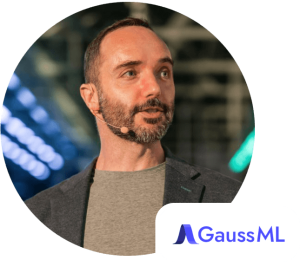Keynote: Building Data Accuracy and AI Trust in Smart Manufacturing
80% of your manufacturing data is unusable by AI—stalling your smart factory initiatives. From CAD drawings and inspection logs to SOPs and compliance documents, critical data lives inside unstructured formats that AI can’t reliably access or trust. Without structured, validated inputs, even your best digital twin or predictive maintenance model is built on shaky ground.
In this session, Adlib Software CEO Chris Huff and CPO Anthony Vigliotti reveal how global manufacturers are eliminating this “last mile” bottleneck through AI-ready document workflows. You’ll learn how Adlib’s Transform platform extracts, validates, and delivers clean, contextual data from over 300 file types—including legacy formats and complex technical documents—ensuring high-trust inputs across PLM, MES, ERP, and LLM systems.
• The Trust Gap: Why most AI initiatives fail without structured, validated data
• Digital Twins: Improve model accuracy by up to 40% with pixel-perfect CAD-to-PDF transformations
• ESG & Compliance Reporting: Cut audit prep time by 60% through automated validation and document standardization
• SOP Distribution: Accelerate shop floor readiness with automated generation, validation, and delivery
• AI Trustworthiness: Reduce hallucinations and improve explainability using Retrieval-Augmented Generation (RAG) on verified source documents
• Unlike generic IDP or PLM platforms, Adlib’s Transform platform handles 300+ legacy formats and complex docs with 50% higher accuracy, ensuring compliance without vendor lock-in
Agentic AI in Manufacturing: From Copilots to Autonomous Systems
Many manufacturers are stuck at the “AI proof-of-concept” stage — able to generate insights but unable to turn them into consistent, autonomous action. Agentic AI changes that. These systems can interpret shifting production priorities, resolve conflicts across data silos, and act in real time without constant human intervention. This panel explores what it takes to move from advisory AI copilots to trusted, self-directed systems — and how doing so can address chronic challenges like delayed decision-making, inefficiencies hidden in complex workflows, and the growing gap between AI potential and actual plant-floor impact.
Wiring the Factory Brain: Building the Real-Time Data Architecture for Industrial AI
AI can’t deliver insights without fast, contextual, and connected data. This session focuses on the foundational infrastructure that makes intelligent operations possible — from MQTT-based unified namespaces to real-time data modeling at the edge and cloud. Learn how manufacturers design data systems that feed AI with the precision and context it needs to drive operational value, scale across facilities, and adapt to change.
Predict, Prevent, Optimize: Real Results from Augmented Industrial Data
This session will dive into how industrial organizations are using augmented data—combining real-time time series inputs with contextual, historical, and metadata layers—to solve high-impact problems across manufacturing. From detecting hidden patterns in rotating equipment to improving load balancing across distributed assets, panelists will share concrete use cases where augmented data delivered faster root-cause analysis, reduced manual intervention, and improved system reliability—without major changes to existing OT stacks.
Agentic AI & Integrated Data Workflows: Extracting Value from Existing Manufacturing Systems
Learn how forward-thinking manufacturers are using agentic AI to tap into existing data sources and dashboards—accelerating value without starting from scratch. The session will cover strategies for integrating domain-specific workflows, boosting quality with minimal infrastructure changes, and aligning digital tools with lean operational goals.
Designing AI Systems that Grow, Learn, and Pay Off Over Time
Scaling isn’t just deployment — it’s building AI systems that improve with use, adapt to new data, and compound value across workflows.
This session will focus on evolutionary design, platform thinking, and ROI over the lifecycle.
Protocol Spotlight: How to Use Model Context Protocol to Power Your Agentic AI Strategy
As the AI ecosystem shifts toward increasingly autonomous systems, giving agents access to meaningful, structured context is no longer optional. This session puts a spotlight on Model Context Protocol (MCP), an impactful standard designed to deliver semantic context to AI agents at the edge, in the cloud, and across your organization. Panelists will discuss real-world use cases, emerging trends, and the architectural role MCP plays in accelerating AI initiatives.






























